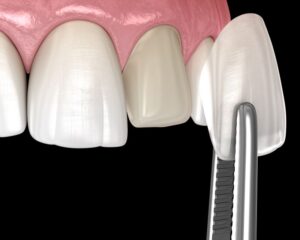
Veneers are one of the most transformative cosmetic dental treatments. They can hide a range of imperfections, including discoloration, chips, cracks, and more. However, some people are reluctant to commit to veneers because they have heard that the treatment process requires that some tooth enamel be removed. How much enamel is removed, and will you have to worry about heightened dental sensitivity after you get veneers? This blog post explains what you should know.
Veneers And Dental Sensitivity
While the prospect of having some of your tooth enamel removed might seem a bit scary, there is nothing to be alarmed about. In fact, your dentist might have to remove as little as half a millimeter of enamel, which is roughly the thickness of a fingernail. This part of the treatment process is important for veneers because it allows the end result to appear natural and seamless, rather than bulky.
Admittedly, the removal of a bit of enamel can cause an increase in dental sensitivity. That is because the enamel’s job is to protect the sensitive dentin beneath it. Dentin has tubules that connect to the tooth’s nerve. When the tubules come into contact with hot and cold temperatures, the tooth’s nerve sends pain signals to the brain.
The good news is that veneers replace the lost tooth enamel. Once they are permanently bonded onto your teeth, they can provide significant protection against outside stimuli. Any sensitivity that you experience during the days after your treatment will likely be due to the procedure itself, rather than the modifications to your tooth enamel.
For most patients, veneer-related sensitivity wears off within a few days or weeks of their treatment. In fact, some people even discover that their teeth ultimately become less sensitive than they were before their procedure.
Dealing with Veneer-Related Sensitivity
Here are a few tips that can minimize the sensitivity that may occur after you receive veneers:
- Adjust your eating habits. Try to minimize your intake of hot, cold, and spicy foods. Instead, consume a mild, soft diet.
- Take a pain reliever if necessary. An over-the-counter pain medication can reduce discomfort.
- Rinse with salt water. Dissolve a teaspoon of salt into a cup of warm water. Swish with the solution to reduce oral discomfort.
Veneers may cause a temporary increase in dental sensitivity, but they are not bad for your oral health. In fact, they can even provide a degree of protection for your teeth!
Meet the Practice
The experts at Meriden Dental Group offer a full range of cosmetic services, including veneers. We approach treatment with great care in order to reduce the potential for sensitivity. Your oral health is our first priority! If you have questions about veneers or what to expect with treatment, we would be pleased to speak with you. Contact our team at 203-404-6800.
